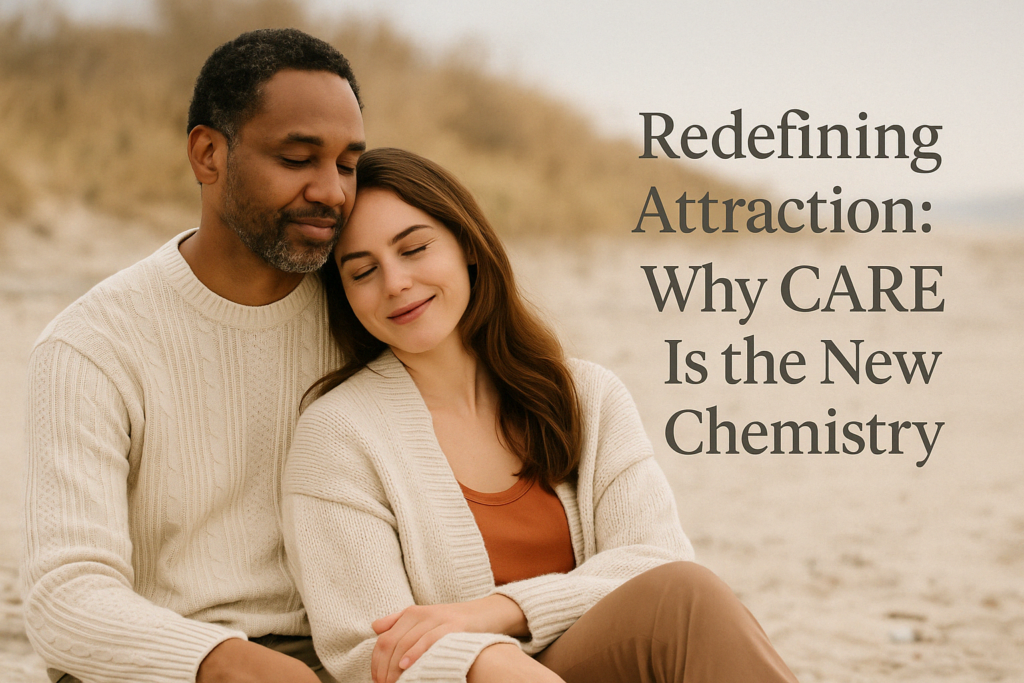|
Getting your Trinity Audio player ready...
|

There’s a moment—quiet, almost imperceptible—when our understanding of love begins to shift. The allure of charm, the flutter of butterflies, the magnetic pull of beauty—suddenly, they aren’t enough.
What once felt like the pinnacle of attraction begins to feel like the start of a lesson. Because real love doesn’t live in first impressions—it lives in how we show up, day after day.
We no longer chase sparks alone. Now, we crave CARE:
Clarity, Accountability, Reliability, Emotional Safety—and, when we’re fortunate, Supportiveness.
From Fantasy to Foundation: The Evolution of Attraction
In our youth, attraction tends to follow a familiar script. It’s passionate, impulsive, and often unexamined. We chase what dazzles—looks, charisma, intrigue. But as we grow, the script changes.
“The most romantic thing is not grand passion, but a shared life—built slowly, respectfully, and with mutual understanding.”
— Alain de Botton, The Course of Love
Psychologists and philosophers alike have come to similar conclusions: attraction without emotional depth is fleeting. What endures is rooted in secure attachment, inner alignment, and conscious connection.
This is where CARE comes in—not just as an acronym, but a new compass for choosing and being the right partner.
C — Clarity: Seeing Ourselves and Each Other Clearly
In a world of curated personas and filtered realities, clarity is radical. It begins with self-awareness and ripples outward into how we relate to others. Clarity means knowing what you want, expressing it honestly, and being willing to navigate life with transparency.
“The curious paradox is that when I accept myself just as I am, then I can change.”
— Carl Rogers
Emotional congruence—when our internal state matches our outward behaviour—creates trust. Clarity is about saying what we mean, and meaning what we say. It’s the opposite of mind games. It invites open dialogue, directness, and emotional intelligence.
Clarity turns dating from a guessing game into a genuine connection.
A — Accountability: The Courage to Own Our Impact
Attraction without accountability is short-lived. We may admire confidence, but we trust those who take responsibility—for their actions, their mistakes, and their growth.
“When we deny our stories, they define us. When we own our stories, we get to write the ending.”
— Brené Brown
Accountability is not about being flawless. It’s about being honest. It means saying “I was wrong,” and making the effort to repair. It’s owning our side of the street without finger-pointing or deflection.
This kind of personal responsibility is emotionally magnetic. It shows that someone is ready for partnership—not performance.
R — Reliability: The Quiet Power of Consistency
The grand gesture has its place—but the true currency of love is consistency. We fall in love with how someone shows up.
“Love is not only a flame, it is a light. And to keep that light burning, one must tend to it daily.”
— Kahlil Gibran
In attachment theory, reliability builds emotional security. It tells your partner: You can count on me. Not just when it’s convenient. Not just when you’re winning. But always.
It’s the text that says, “I’m thinking of you.”
It’s the follow-through on small promises.
It’s the person who is where they say they’ll be, doing what they said they’d do.
Reliability doesn’t sparkle—it sustains.
E — Emotional Safety: Where Real Love Grows
Without emotional safety, love can’t thrive. We may be drawn to someone who excites us, but we stay with someone who makes us feel emotionally secure.
“The most functional way to regulate difficult emotions in love relationships is to share them.”
— Dr. Sue Johnson
Emotional safety means your partner doesn’t weaponize your vulnerabilities. It means conflict is navigated with care, not control. It means you can be seen in your full emotional truth—and still feel loved.
This kind of safety allows for deep intimacy. We stop hiding. We share more. We trust more. And as we open, love deepens.
(S) — Supportiveness: Love That Shows Up
If there’s one bonus element that completes the CARE model, it’s Supportiveness—because love is not just spoken, it’s demonstrated.
“What’s the greatest act of love? To be someone’s home when they’re not sure where they belong.”
— Rupi Kaur
Supportiveness is active care. It’s encouragement. It’s presence during loss, celebration during wins, and gentle truth during doubt.
In mature relationships, supportiveness is mutual. It’s not about rescuing each other—it’s about rising together.
CARE as a New Philosophy of Love
What makes CARE different from old-school definitions of attraction is that it places character before chemistry. It values self-knowledge and relational maturity as the building blocks of sustainable love.
This aligns with the psychology of companionate love—a concept grounded in trust, affection, and shared values over the thrill of passion alone.
“Love isn’t about finding the right person. It’s about being the right partner.”
CARE reframes love from a passive experience to an active choice. It’s not about falling—it’s about building.
Why CARE Is the New Chemistry
We’re not giving up on romance. We’re reimagining it.
Romance is now the daily thoughtfulness.
It’s emotional consistency.
It’s loving with clarity, showing up with reliability, apologising with accountability, holding space with emotional safety, and lifting each other with support.
CARE teaches us that real love is not found in the fireworks.
It’s found in the flame that burns steadily—quietly warming our lives.
So yes, chemistry still matters. But without CARE, chemistry is a spark without a fire. With CARE, love becomes not only possible—but powerful.
Clarity. Accountability. Reliability. Emotional safety.
That’s what grown-up attraction looks like. That’s CARE.
